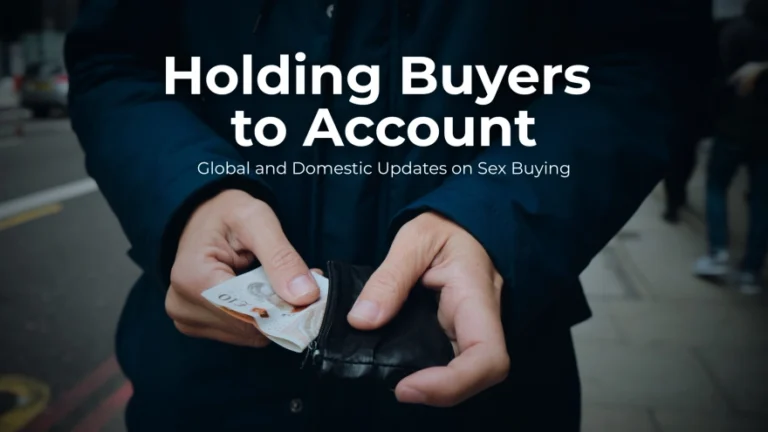The European Parliament recently commissioned a report to assess the differing prostitution regulations in European Union Member States and current sex trafficking and related data. The aim of this report was to identify and evaluate the risks in Member States employing different legislative approaches to prostitution, and to suggest ways to reduce these risks.
This is a significant report in the fight to end sexual exploitation in the EU.
Prostitution’s Inherent Harms
We know that prostitution is inherently harmful, involves high rates of physical, sexual, and emotional violence, and has detrimental effects on the mental and physical health of those involved.
We know that the people involved in, and specifically targeted for prostitution are disproportionately women and girls, though boys, men, and transgender people are also affected. People who are prostituted are predominantly poor and in the EU the majority are migrant women trafficked between EU countries, usually from East to West.
We also know that prostitution and sex trafficking are inextricably linked, built on a system of gender, race, and economic inequality and driven by the male demand for paid sex.
Prostitution and Sex Trafficking are Linked
There is a wealth of research and lived experience that testifies to the connection between prostition and sex trafficking.
The European Parliament’s Resolution of 26th February 2014 on sexual exploitation and prostitution and its impact on gender equality considers both prostitution and sex trafficking as “forms of slavery incompatible with human dignity and fundamental human rights’ and ‘both a cause and a consequence of gender inequality.” The Resolution goes on to state that prostitution itself is “a violation of women’s rights—a form of sexual slavery.” The European Parliament therefore advocates for the introduction of the Nordic Model of prostitution legislation.
Yet, despite all of this, there is still debate across EU Member States on how best to view and address prostitution and sex trafficking.
Differing Policies Addressing Prostitution and Sex Trafficking Across the EU
Legalized But Regulated
The report outlines that Germany and the Netherlands, for example, adopt a legalized but regulated approach to prostitution, which means that the buying and selling of sex in certain forms and locations is permitted. Those involved in prostitution can theoretically benefit from ‘work contracts’ and prostitution is subject to labour regulations, as per other ‘regular’ labour sectors. The women, as it is mostly women, can access social service benefits and pensions.
In total there are six Member States that legalize but regulate prostitution. Each implements varying regulations, some of which can differ within Member States themselves, due to federalization. One specific example of differing Member State law is Greece, which, according to this report, stipulates that people involved in prostitution must be “single, divorced, or widowed” and adhere to strict, regular testing for sexually transmitted diseases. Although the latter is indeed more common within some regulations (primarily to protect buyers), it is a nod to the reality of the effects of prostitution on the physical health of prostituted people. The former raises serious questions of gender inequality, even within a system already deeply gendered and entrenched in inequality.
Legalized But Unregulated
The majority (16) of Member States take a legalized but unregulated approach—similar to a “decriminalized” approach. Again the interpretations and implementation of this approach differ from country to country. Some Member States, for example, specifically criminalize people who buy sex from trafficking victims—something this report highlights is a common occurrence.
Prohibition Model
The remaining Member States implement variations of the Prohibition Model of prostitution, with two criminalizing the person selling sex, and one punishing both the person who buys sex and the prostituted person. France, Ireland, and Sweden have adopted the Nordic Model, which decriminalizes the person selling sex—recognizing them as victims of exploitation who need services—and criminalizes the sex buyers in order to reduce the demand for the sex trade.
Differing Policies Leads to Differing Results
The EU’s lack of cohesion across Member State’s national approaches to prostitution may seem unimportant but it is, in fact, quite problematic.
Member States that adopt a legalized approach to prostitution, both regulated and unregulated, have vastly higher rates of prostitution and sex trafficking.
Germany’s prostitution rate is between 30 and 40 times that of Sweden.
In the Netherlands “trafficking still thrives behind the façade of a legalised prostitution sector.”
In contrast, the Nordic Model has reduced the extent of human trafficking in Norway and Sweden and the rates of men who buy sex are significantly lower.
This makes countries who take this approach much less viable for prostitution and sex trafficking and related organized crime. This report concludes that “on average the level of (identified) sex trafficking is much higher under a legalization model than under a prohibition one.”
Increased Trafficking is Tied to Increased Organized Crime and Human Rights Violations
This disparity is problematic, as instead of reducing human trafficking across the entire EU, different legislative approaches means that, “some countries “attract” more trafficking flows for the purposes of sexual exploitation” than others. As this report points out: with more trafficking flows comes more organized crime and more trafficking-related human rights violations—something the EU actively seeks to prevent and eradicate.
National prostitution legislation that contributes to an increase in human trafficking is directly contravening EU policy. As the report rightly states, the EU acknowledges gender equality as a fundamental human right that should be protected and upheld. The EU cannot do this as long as some Member States actively implement legislation that is known to directly increase prostitution and sex trafficking, crimes that disproportionately effect women and girls, and reinforce structures of gender inequality.
Recommendations for EU Member States
To counteract this, the report suggests that the EU Anti-trafficking Directive 2011/36/EU be amended to request Member States criminalize buyers of prostitution—a welcome recommendation. However it suggests that this can be done in either of two ways:
- Member States can adopt a model of regulation that involves control of the legal market (i.e. Germany) but criminalizes those who buy unregulated prostitution services. Or:
- Member States adopt a prohibition model which criminalizes buyers of prostitution across the board.
We cannot emphasize enough the drastic consequences of adopting the first option. While criminalizing buyers is welcome, the wider approach is fraught with difficulties.
This very report has described the consequences of legalizing prostitution, both with and without regulations. Human trafficking is rife within the legalized system of prostitution and the EU itself states that prostitution is incompatible with gender equality and is tantamount to sexual slavery.
Slavery cannot be condoned, nor can it be regulated.
The second option, however, is a positive way to both reduce human rights violations of people being bought for sex and as suggested by this report, “is capable of taking into consideration gender inequality.”
Building on this, the report’s following recommendations include:
- The EU enacts a new Directive asking Member States to adopt a prohibitionist model of prostitution, criminalizing the purchase of sexual services tout court (completely).
- The EU addresses the root causes (social, economic and cultural) of prostitution and sex trafficking.
- To conduct an EU periodic standardised self-report survey on clients (buyers) of prostitution.
We urge Member States and the European Parliament to adopt the above recommendations, starting with a new clear Directive on criminalizing the purchase of sex and providing services and exit opportunities to prostituted people.



